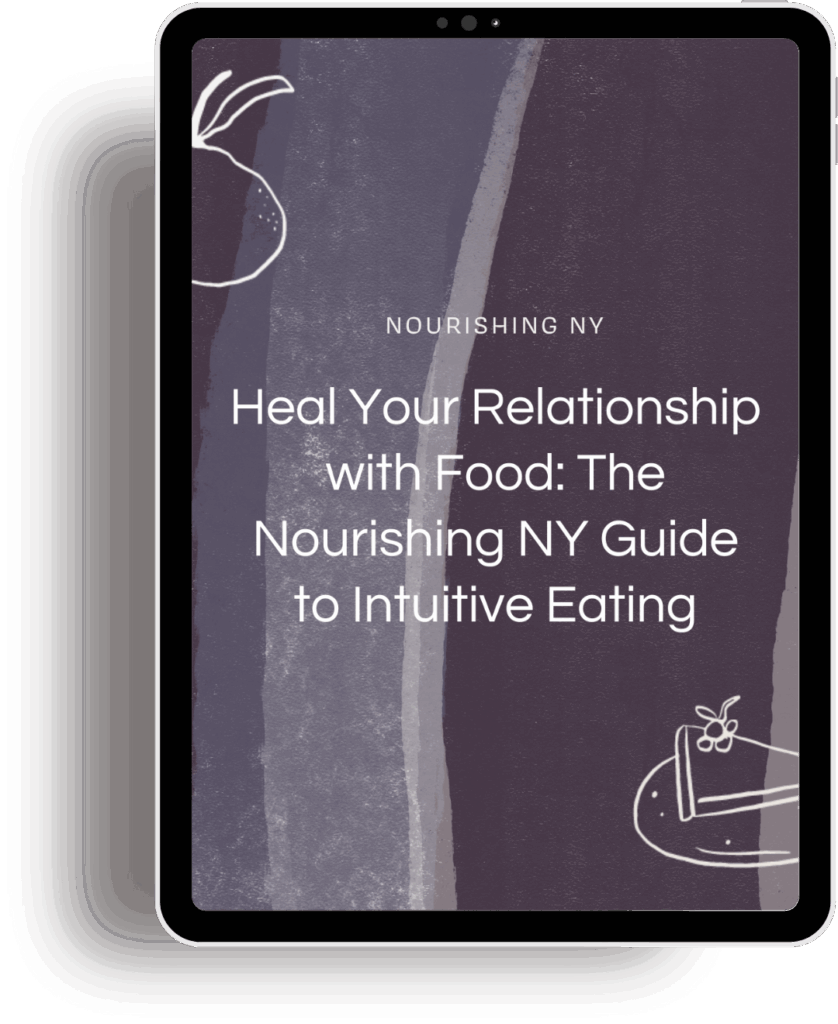Why Spring is the Best Time to Embrace Intuitive Eating
As the weather gets warmer, the pressure to “get summer body ready” increases. We can see this on social media, in conversations with others, and maybe even through our own internal dialogue of what the “ideal body” should look like. The idea of needing to change our bodies for the summer is harmful and the drive for weight loss can lead to an unhealthy relationship with food and body, disordered eating, and for some, eating disorders. The idea of “summer body” also sends the message that how we look is more important than other things in life: holistic health, enjoying the warm weather, spending time with others, etc. The number on the scale does not equate to health and the messages social media can send as the weather warms up are problematic and driven from diet culture.
As the weather gets warmer, the pressure to “get summer body ready” increases. We can see this on social media, in conversations with others, and maybe even through our own internal dialogue of what the “ideal body” should look like. The idea of needing to change our bodies for the summer is harmful and the drive for weight loss can lead to an unhealthy relationship with food and body, disordered eating, and for some, eating disorders. The idea of “summer body” also sends the message that how we look is more important than other things in life: holistic health, enjoying the warm weather, spending time with others, etc. The number on the scale does not equate to health and the messages social media can send as the weather warms up are problematic and driven from diet culture.
What is Intuitive Eating?
Intuitive eating is an anti-diet framework with 10 principles that support you in increasing interoceptive awareness of your own body – hunger, fullness, appetite, satiety, and movement1. Intuitive eating also incorporates body neutrality, which includes respecting your body, nourishing your body, and accepting your body. An intuitive eating dietitian can help support you through the 10 principles to develop a healthy, sustainable relationship with food and body. Below is an overview of each principle:
Reject the Diet Mentality
This principle encourages you to say goodbye to dieting. Whether this is throwing away a diet cookbook, unfollowing influencers that promote weight loss and/or dieting on social media, or throwing away the 0 carb pasta, taking these steps can support you in rejecting the diet mentality. You are allowed to feel angry, frustrated, or whatever other emotion towards diet culture. Diets don’t work and there is a reason that there are hundreds of different diets out there.
Honor Your Hunger
Understanding how hunger shows up in your body can help you understand how your body communicates to you. It’s also important to understand other factors that can influence hunger levels, such as sleep, stress, illness, adequate nourishment, etc.
Make Peace with Food
Giving yourself unconditional permission to eat food challenges the diet mentality. When we tell ourselves a food is “bad” and we eat it, this increases guilt and shame which further perpetuates the idea we need to stay away from this food. Removing labels on food and working towards a neutral mindset helps remove any morality dieting or diet culture may have convinced us is connected to food.
Challenge the Food Police
Alongside making peace with food, challenging the food police involves reframing and challenging all the thoughts around food that diet culture has taught us. Whether that’s the idea that you’re “good” because you replaced carbs with vegetables or that you’re “bad” for eating dessert, challenging these ideas with self-compassion is an important step towards intuitive eating.
Respect Your Fullness
Alongside honoring your hunger, respecting your fullness is a significant part of the intuitive eating journey. Understanding the ways your body communicates fullness, whether physical or mental, is important in understanding your body’s needs.
Discover the Satisfaction Factor
Eating is much more than just nutrition, it’s also about connection to culture and peers, comfort, travel, traditions, celebrations, and enjoyment. Discovering our true food preferences and foods that make us feel full and satisfied is an important part of intuitive eating and developing a healthy relationship with food.
Honor Your Feelings Without Using Food
Identifying our emotions and ways to cope with them without using food is part of the intuitive eating journey. This also includes understanding food can be comforting and that is okay. Sitting with discomfort of eating past fullness, rather than taking it out on the food, is also a way to honor your emotions.
Respect Your Body
Respecting our body is key to the intuitive eating journey. Letting go of society’s “ideal” body and working towards accepting your body is significant. Even on bad body image days, we still need to respect, accept, and nourish our bodies. Nourishment is self-care.
Exercise- Feel the Difference
Shifting focus on how it feels to move your body rather than trying to change your body or burn calories. Finding movement that feels good in your body and discovering healthy intentions to move will make exercise and movement enjoyable.
Honor Your Health
The idea of gentle nutrition is to honor our health and bodies with foods that both nourish us and we enjoy. Intuitive eating is not about the perfect diet. Intuitive eating acknowledges there’s a lot more to health and nutrition than “eat when you’re hungry and stop when you’re full.” Health is holistic and encompasses more than just physical health.
Intuitive eating is not a diet. Traditional dieting focuses on fear mongering tactics and usually involves caloric restriction, restriction of a certain macronutrient (usually carbs or fat), or promoting use of a supplement. Intuitive eating involves the mind-body connection to gain an understanding of your own personal hunger and fullness cues and appetite and satiety. Intuitive eating challenges traditional food views (good and bad) and challenges rules around what a healthy body “should” look like to ultimately help you discover what a healthy relationship with food and body looks like for you, all with self-compassion and kindness.
Navigating Seasonal Changes with Intuitive Eating
As we approach warmer weather, we usually crave food that helps us cool off. This may include ice cream, fruit, salads, ices, milkshakes, and other cold treats. An intuitive eating nutritionist in NYC can support you in challenging disordered food beliefs around these foods (i.e. salads are healthy, ice cream is not) to promote stress-free enjoyment of these foods.
Food is more than just nourishment. After a long, hot day at the beach, getting ice cream with a friend is about more than just the ice cream. Besides nourishment as an afternoon snack, it provides enjoyment and social connection. When we begin to expand what our food values are, we can reject the diet mentality around these foods and work towards that unconditional permission to eat.
In the summer, we understand there are usually changing routines, more social events, and vacations. An intuitive eating dietitian can support you in coming up with a plan to incorporate more food flexibility, give yourself grace, and speaking to yourself with self-compassion while challenging any remaining diet food beliefs.
How Our NYC Nutritionists Support Intuitive Eating
Personalized coaching and counseling from an intuitive eating dietitian can guide you on your intuitive eating journey and help repair your relationship with food and body. Our team of registered dietitians at Nourishing NY utilize an intuitive eating and Health at Every Size® framework. An intuitive eating nutritionist can help you discover your own hunger and fullness cues, as we understand this can look different from person to person. Hunger can present as physical (growling and emptiness in the stomach, fatigue, numbness, gnawing in the throat, dizziness) and can also present as mental/emotional (increased thoughts about food, difficulty concentrating, irritability). Some strategies an intuitive eating nutritionist may suggest to increase your awareness of body cues may be utilizing a hunger/fullness chart, practicing mindfulness during meals, and/or logging your food in an anti-diet app such as Recovery Record or Nourishly.
Alongside increasing interoceptive awareness, an intuitive eating nutritionist can address your fears around weight and body image. Reframing negative self-talk around our bodies and focusing on the functionality rather than appearance can be helpful steps to body neutrality. Body neutrality and intuitive eating encourages respect for our bodies, which includes proper nutrition and speaking kindly to ourselves, regardless of how we think or feel about our body that day.
How to Get Started with an Intuitive Eating Nutritionist in NYC
When looking for an intuitive eating nutritionist, it’s important to seek out the following:
- RD/RDN (Registered dietitian nutritionist)
- CIEC (Certified Intuitive Eating Counselor)
- CEDS (Certified Eating Disorders Specialist)
If you find a registered dietitian that is not a certified intuitive eating counselor, look for their experience with intuitive eating. Many dietitians and nutritionists can specialize in intuitive eating without certification. Some key words to look for may be: intuitive eating, all foods fit, anti-diet, weight neutral, weight inclusive, Health at Every Size (HAES)®.
Our team at Nourishing NY can provide nutrition and intuitive eating counseling. Insurance coverage for nutrition services is important in making nutrition support accessible. Our dietitians at Nourishing NY are in-network with major insurance companies, including Aetna, Blue Cross Blue Shield, Cigna, and United Healthcare.
Step into a Season of Food Freedom
Let’s step into spring and embrace a healthier relationship with food and body. Intuitive eating promotes holistic health which is most sustainable. How are you practicing food freedom this summer?
1. Tribole, E., & Resch, E. (2012). Intuitive eating. St. Martin’s Griffin.



